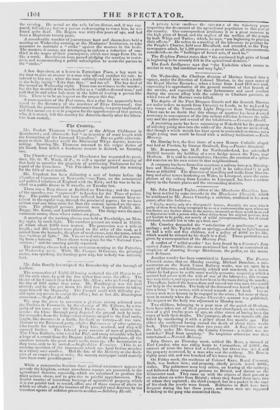While a comparative freedom from political excitement appears to pervade
the kingdom, certain unwelcome aspects are presented, in the agricultural districts, especially, which are calculated to produce the most serious alarm, and to give rise to painful apprehensions. The fearful number of incendiary buntings of agricultural property, which it is our painful task to record, offers one of those causes of alarm to which we allude ; and the invasion of the peaceful rural districts by the truculent agents of sedition presents another.—Salisbury Herald. A private letter confines the stint me it of the Salisbury paper respecting the discontent of the agricultural population in this part of the country. Our correspondent attributes it in a great measure to the high price of bread, and the neglect of the welfare of the people by both Whigs and Tories; which, he says, "are beginning to produce their effects." He refers to a meeting of the labourers to petition for the People's Charter, held near Blandford, and attended, as the Tory newspapers admit, by 1,500 persons—a great number, all circumstances considered—as the " harbinger of future acts, if need be."
The Di iyhton Patriot states that " the continued high price of bread is beginning to be severely felt in the agricultural districts."
The Leeds Intelligencer says that "the Yorkshire wheat comes to mat ket in very bad condition and very light."


























 Previous page
Previous page